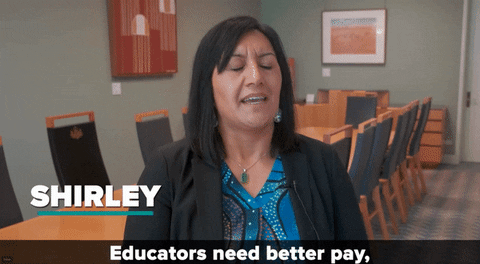It’s been a whirlwind of a month.
Australia hosted the 5th International Trade Union Confederation (ITUC) Congress with union members from around the world. A report came out that revealed Tasmania as home to the lowest-paid workers in Australia.
We’ve rounded up some of the big stories affecting workers across the country and the world.
No more band-aid solutions for early childhood educators
If anyone can show us how much Australia needs new work laws, early childhood educators can.
Working 12 hour shifts with poor pay is the norm. Educators are leaving the sector because they can’t hold out any longer.
Early childhood educator and union member Anusha spoke about why our senators need to support the Secure Jobs, Better Pay Bill.
“My sector is in a big crisis we have never seen before. Most of the educators are leaving the sector because they are undervalued, underpaid and dealing with a lot of stress,” Anusha said.
“I am here asking for urgent real reform from you to fix those things.”
So where are the exorbitant childcare costs ending up? The United Workers’ Union traced millions of dollars in childcare profits to the pockets of CEOs.
Businesses can afford to pay for wage increases. The only reason they have to reject this bill is greed.
It’s not just the early childhood education sector in trouble. Workers’ wages across the country have barely budged for a decade.
How we can fix the gender pay gap
The Australian Council of Trade Unions released a report ‘Reducing the Gender Pay Gap with multi-employer bargaining’ which showed how important it is to update how work laws in Australia.
It is unacceptable that we still have a gender pay gap in this country, especially one so large that it sees the average working woman earn $264 less per week than a working man.
The report highlighted multi-employer bargaining as crucial to delivering pay rises and evening the divide between earnings on gender lines.
Women on collective agreements earn $102 per week more than women who are not, and workplaces with collective agreements have lower gender pay gaps than those without.
Multi-employer bargaining will contribute to gender equality by raising wages in female-dominated industries: this is evident in countries overseas that show a direct correlation between higher levels of multi-employer bargaining and lower gender pay gaps.
The Secure Jobs, Better Pay Bill will help accelerate gender equity in the workplace through multi-employer bargaining and giving the power back to working women.
The world kick-off for migrant workers’ rights
The FIFA World Cup kicked off this month under a dark cloud.
Host nation Qatar has come under fire for its appalling treatment of migrant workers – including from the Socceroos who, as union members, came out in solidarity with migrant workers in Qatar.
The migrant workers that have paved the way for Qatar to host the FIFA World Cup have been heavily exploited, suffering from wage theft and forced labour. There have even been incidences of unexplained migrant worker deaths.
“These migrant workers who have suffered are not just numbers,” the Socceroos said.
“Like the migrants that have shaped our country and our football, they possessed the same courage and determination to build a better life.”
This collective action from the Socceroos has been part of a larger campaign that has seen union members achieve wins for migrant workers and queer workers for decades. And we certainly won’t be stopping anytime soon.
No matter what job you do, organised workplaces are where workers in unions stand with each other. It’s why union members earn, on average, $250 more per week than non-union members.












SHARE:
Band-aids, football, and the gender pay gap. Here’s the news you might’ve missed this month.